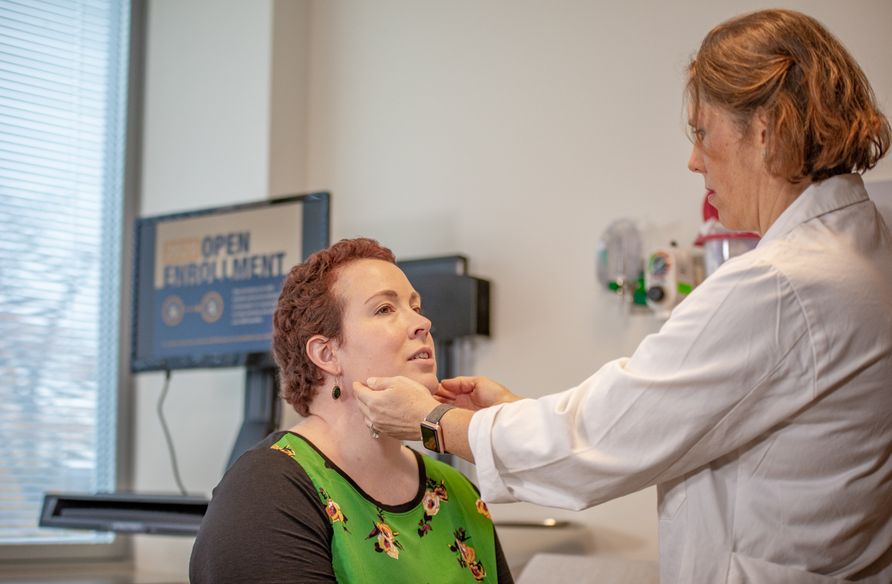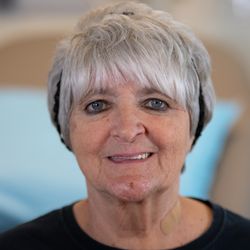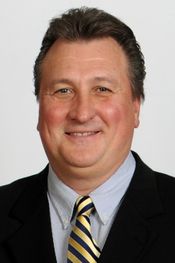Dorothy Bolyard credits divine intervention for the rare moment of klutziness that
changed her life. An unexpected collision with a doorway at home led Bolyard
to discover a lump in her breast, which turned out to be cancerous.



Bolyard’s doctor referred her to the
WVU Cancer Institute
, where she participated in a clinical research trial – one of hundreds conducted
with support from the
Norma Mae Huggins Cancer Research Endowment Fund
– that reduced her treatment time and offered insight to benefit future patients.
“I thought it could help other people and then possibly help myself, too,” Bolyard
said of the trial. “The knowledge that they gain from it helps with continued
research, and I think that’s a good thing.”
WVU
Men’s Basketball
Coach Bob Huggins
launched the endowment fund after his mother, Norma Mae Huggins, lost her
battle with colon cancer in 2003. To date, the fund has raised about $5 million
to support clinical research trials for cancer patients in West Virginia. But,
to the patients and physicians impacted by those funds, their value is priceless.
Advancing the standard of care
Clinical trials offer opportunities for patients and health care providers to
participate in cutting-edge research aimed at advancing the standard of care.
Continued research ultimately leads to better long-term patient outcomes, particularly
in states like West Virginia. Studies show that cancer patients who live in
rural areas often have lower survival rates – except when they are involved
in clinical trials. WVU Medicine’s network of healthcare facilities expands
access to innovative treatment options throughout the state.
“Clinical trials at WVU can be anything from early stage, first-time-in-humans
studies to later-stage registries where we’re looking at long-term survival
or long-term benefit of a drug for our patients,” Anne Schnatterly, director
of the WVU Cancer Institute’s Clinical Research Unit, said.
Participation in clinical research trials ensures that WVU providers stay up
to date on the latest advances in cancer care. The standard treatments available
to cancer patients today were adopted by clinicians nationwide after research
trials demonstrated their effectiveness.
The opportunity to further the science behind cancer treatment also helps WVU
to attract and retain top-quality practitioners. Faculty members at WVU have
had their work featured in journals that influence medical practice and continued
research far beyond West Virginia’s borders. Cancer care is constantly evolving
as ongoing studies identify newer, better ways to treat different varieties
of the disease.
For instance, when Norma Mae Huggins was diagnosed, there were only a few drugs
available to treat colon cancer. Today, there are more than a dozen. Those
drugs were validated through clinical trials, including some conducted at WVU.
“As a clinician who participates in clinical trials, our first and foremost goal
is that we do the best for our patients,” said Dr. Abraham Kanate,
who treats patients with cancers that originate in the cells of blood-forming
tissue, including leukemia, lymphoma and myeloma. “There is nothing to beat
the feeling when you actually enroll a patient in a clinical trial and the
newer treatment has actually worked better than what you would have otherwise
offered them.”
Research-focused culture
Money raised through the Norma Mae Huggins Cancer Research Endowment Fund provides
the necessary tools and personnel to expedite and streamline clinical trials
at the WVU Cancer Institute. Among those tools is OnCore, an online system
that supports clinical trials by storing patient data, facilitating communication
among providers and more.
The Clinical Research Unit employs 25 staffers who coordinate 214 active clinical
trials spanning all types of cancer. Of those, patients are actively being
recruited for 107 trials. Officials are working to expand clinical trials by
enrolling more patients at regional WVU Medicine sites, exploring new types of trials and pursuing collaborative opportunities, among
other efforts.
To date, more than 4,100 patients have participated in 879 clinical trials offered
through the WVU Cancer Institute. Though only 3-5% of patients participate
in clinical trials nationwide, WVU has boosted its participation rate slightly
higher thanks to a research-focused culture that emphasizes the importance
of clinical trials in advancing cancer care.
“Patients are really unselfish here,” said
Dr. Hannah Hazard-Jenkins,
a breast cancer surgeon who serves as director of clinical services at
the WVU Cancer Institute’s
Mary Babb Randolph Cancer Center
.“It’s really quite astounding. Even if you approach somebody and say, ‘I know
this isn’t going to directly impact you, but you may impact the next generation,
or it may impact somebody five or 10 years from now,’ there are not many people
who say no.”
Seeking a cure
Linda Carleo is among those who said yes. After previously conquering breast
cancer, she was diagnosed with late-stage lung cancer that had spread to her
lymph nodes and started chemotherapy at United Hospital Center in Bridgeport.
When she refused to continue because the treatment made her severely sick,
she came to the WVU Cancer Institute seeking an alternative to chemo with the
potential to save her life.
“
I was scared to death,” Carleo said. “I’m in the fourth stage, and that’s it.
It’s over after that. But I’m a fighter. I’m a survivor, and I’m not going
to let anybody tell me that I’m going to die. Because I’m not.”
C
arleo’s cancer is improving since starting a series of infusions in Morgantown.
Prior to each treatment, she receives two shots in her thigh to strengthen
her immune system. Though she suffers from pain in her arm and breast, she
has experienced none of the side effects that made chemotherapy so debilitating.
“I’m real pleased with this, very pleased,” Carleo said. “And I like the idea
of helping people. If I can help people, I would like very much to do that,
so they’ll know in advance what it’s like.”
Bolyard’s clinical trial involved treating her exposed tissue with radiation
during lumpectomy surgery, reducing her post-operation radiation treatments
by five days. Now cancer-free, she finds herself more compassionate toward
others suffering from illness and says she is grateful for the fateful accident
that launched her cancer journey.
“I just knew God had his hand upon me all along,” Bolyard said. “I knew he was
with me.”
Clinical trials like those involving Carleo and Bolyard are making incremental
advances that pave the way toward a cure for
cancer, which is Coach Huggins’ ultimate goal.
“Who says we can’t find a cure for cancer right here in West Virginia?” Huggins
said. “I think the people in this state deserve a first-class situation in
terms of fighting cancer, and we certainly have that. But we’ve got to get
more. We’ve got to get it to the point where we really can help. I would be
the happiest person in the world if we found a cure for cancer right here in
West Virginia.”
Huggins’ advocacy for clinical trials has not only boosted financial support
via the Norma Mae fund, but also created valuable opportunities to reiterate
the importance of healthy behaviors in cancer prevention and regular medical
screenings for early detection.
Make a donation to the Norma Mae Huggins Cancer Research Endowment Fund
.
Gifts are made through the
WVU Foundation
, the nonprofit organization that solicits and administers private donations
on behalf of the University.